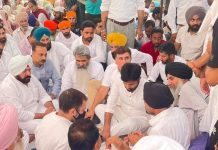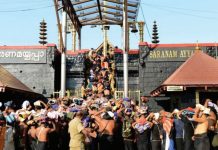
SABIN IQBAL, 50, SENIOR JOURNALIST & AUTHOR
OF THE 25 MILLION strong Indian diaspora currently spread over the globe, over six million live and work in West Asia. Senior journalist and prolific author Sabin Iqbal, who hails from Kerala and spent nearly two decades in the region, has come up with his second novel that is set in a small unnamed West Asian country. Published by Harper Collins, Shamal Days revolves around the life of its protagonist Abbas, a newspaper editor. In an interview with ABDUL WASEY, Iqbal discusses how his new book highlights the aspirations, frustrations and alienations of expatriates living in the region.
EDITED EXCERPTS FROM AN INTERVIEW •
How is Shamal Days different from your earlier novel The Cliffhangers?
The Cliffhangers is set in a small sea town of Varkala, north of Trivandrum, and tells the story of four Muslim youngsters who are caught between the ideologies of Saffron and Green. It raises the disturbing questions of identity and communal harmony which are ‘fragile as papadum’ in the contemporary Indian society. Shamal Days is a far cry from The Cliffhangers in its setting, tone and voice. It is set in a small unnamed country in West Asia. Though primarily it tells the solitude and dilemmas of its protagonist, Abbas, a newspaper editor, it also brings to the fore the aspirations and frustrations, and alienations of a group of expatriates in a newsroom — which reflects life in the country where expatriate workers outnumber the locals. Shamal Days is also about the politics and related tension and violence in the region as much as it is about love, betrayal, loss, death and tragedy.
Do you want each book to stand on its own, or are you trying to build a body of work with connections between each book?
Yes, I do want each book of mine to stand on its own. But the leitmotif of most of the work I am doing now is ‘expatriate life’, especially of those in the Arabian Gulf, which I have lived myself, and can empathise with. One of my next two novels also deals with, though not in great detail, men who live away from their family, and the women who have to get on with their life of having ‘distant husbands’. And, the children who have never seen their fathers. In one shocking incident, a father who comes back home 25 years after his daughter was born, elopes with her, and the entire village shudders under the act of incest. I am also working on a collection of 10 short stories based on expatriate lives in the Arabian Gulf. So, in that way, my novels are loosely connected.
What percentage of non-fiction do you put in your novels? How do you do your research when it comes to adding non-fiction elements in your writings?
I believe that no fiction comes from void. As Shakespeare wrote in King Lear, ‘Nothing will come of nothing.’ I create my fiction from the events and incidents that I have come across or read about. Memories also serve as a productive fodder for fiction. Once Gabriel Garcia Marquez was asked about the difference between journalism and fiction, and he said: “In journalism just one fact that is false prejudices the entire work. In contrast, in fiction one single fact that is true gives legitimacy to the entire work. That’s the only difference, and it lies in the commitment of the writer.
A novelist can do anything he wants so long as he makes people believe in it.” I believe in the writer’s ability for make-believe. As novelists we tell lies mostly, and often present facts in the form of fiction. For me, people around me are my research material. More than I read fiction, I watch people, I often eavesdrop conversations, peep into people’s privacy for material. If I get a chance, I will flip through people’s personal and family albums from where I get flashes of fiction. Most of the incidents described in The Cliffhangers have happened in Kerala over some years. As a journalist, I have made a note of them, and used it in the novel wrapped as fiction. The characters in Shamal Days are people I have met in my years in the Gulf or those who I have worked with in a few newsrooms. I don’t depict them as they are but stretch them out or fictionalise them or the incidents.
Does writing a second book puts more pressure on an author?
It is relative. My first published novel, The Cliffhangers, is not what I wrote first. Shamal Days was written over a period of 10 years, in many phases, and it has undergone changes in storyline, narrative, tone, etc. The biggest pressure is to get the first breakthrough but that doesn’t guarantee publication of the second but it is a tad easier. I am now reworking my first manuscript, which I started more than 20 years ago.
Would you like to give any advice to budding authors?
Never quit. And, make writing your part of being. Writing, especially writing fiction, is a painstakingly lonely affair. If you are writing a novel, it is easy to quit, but don’t. Also, don’t be disheartened by rejections. And, read both masters and contemporary fiction. Also, read intelligently so that it helps you write better. Set a target of minimum word count a day. And, most importantly, enjoy writing.
LETTERS@TEHELKA.COM













